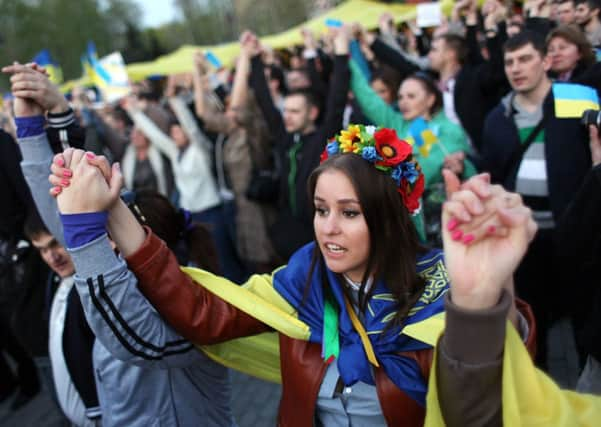Leaders: Confusion in Putin’s double standards


Matters have not been helped by a report that three pro-Russian demonstrators have been killed, nor by an ambiguous statement by Russia’s president Vladimir Putin that he has a “right” to send troops into Ukraine but that he hopes he will “not have to exercise that right”. Having accused the US and its European allies of what he called a double standard, president Putin has forcefully demonstrated one of his own.
Amid growing apprehension over the situation in eastern Ukraine and the build-up of an estimated 40,000-strong Russian force massed near the Ukrainian border, much now rests on the chances of some form of constitutional change that would allow greater decentralisation and regional control. That is a tall order, given all the ambiguities involved in outline constitutional change.
Advertisement
Hide AdAdvertisement
Hide AdBut the more immediate and dangerous ambiguity is in the stance that Mr Putin has adopted, to declare that there is no direct Russian military involvement in eastern Ukraine while Russian military personnel and hardware are clearly evident. Yesterday brought an admission from him that Russian troops had been directly involved in Russia’s annexation of Crimea, having previously vigorously denied this. It is a replay of this surreptitious de-stabilisation in its eastern region that Ukraine most deeply fears.
It is the fog of confusion that is the most disturbing feature of recent events. Wars rarely start with dramatic and unambiguous “shock and awe” brute force, with tank battalions crossing borders. The threat in Ukraine has come from irregular militia widely suspected of operating under the guidance of Russian special forces soldiers and intelligence officers. These are the troubling circumstances by which countries stumble into wars, and that is what all parties who met yesterday in Geneva must guard against. Incidents such as the reported shootings yesterday provide exactly the pretext Russia might use for direct intervention.
A sign of the malevolent forces that can be unleashed in these turbulent circumstances was apparent yesterday in reports of Jews in Eastern Ukraine being challenged by pro-Russian militant groups to declare their ethnicity, and “register” with the pro-Moscow local authorities. John Kerry rightly pointed to this yesterday as a “grotesque” development.
Agreement on a more permanent resolution will prove more difficult. Quite how the balance of power between Kiev and the eastern regions is altered to the satisfaction of Russia but without breaking up the country will be altogether difficult. For the moment, cool heads are needed to defuse a still dangerous stand-off.
On yer bike – but with fewer revs
It IS the Easter Bank Holiday break, and across the land the dust sheets are being pulled off Harley Davidsons for the first exhilarating, noisy, black leather-clad ride of the year. It’s a common misconception that those heading out to the open road in a cloud of burning rubber comprise the local chapter of the Hell’s Angels. More likely they are middle-aged members of the Faculty of Actuaries, Jack Nicholson wannabees re-enacting Easy Rider before life is reduced to a tootle on the mobility scooter.
But such thrills are not without tragic spills. Motorcyclists in their forties are the most at risk on Scotland’s roads. Bikers account for one in eight road deaths. A further 342 bikers were seriously injured last year – nearly 50 more than in 2012. Nine in ten biker casualties are men, with one in three of those killed or seriously injured in their forties.
Police Scotland has abandoned the conventional “don’t risk it” message in favour of one reminding bikers to consider “those waiting for you at home”. Unfortunately, getting away from those waiting at home is exactly the appeal for many.
Middle-aged bikers derive much pleasure from tinkering with their bikes and polishing the chrome. And the pleasure of revving up while stationary in the driveway to awaken residents three streets away can be beyond words – certainly beyond any words we can hope to hear.
Advertisement
Hide AdAdvertisement
Hide AdA simple appeal to keep the speedo at a reasonable mph and take it easy in all conditions is perhaps the most effective message. After all, the last thing the middle-aged bikers will want is to miss next week’s pacy “trends in actuarial science” seminar. Even adrenalin junkies have to pay for that chrome somehow.